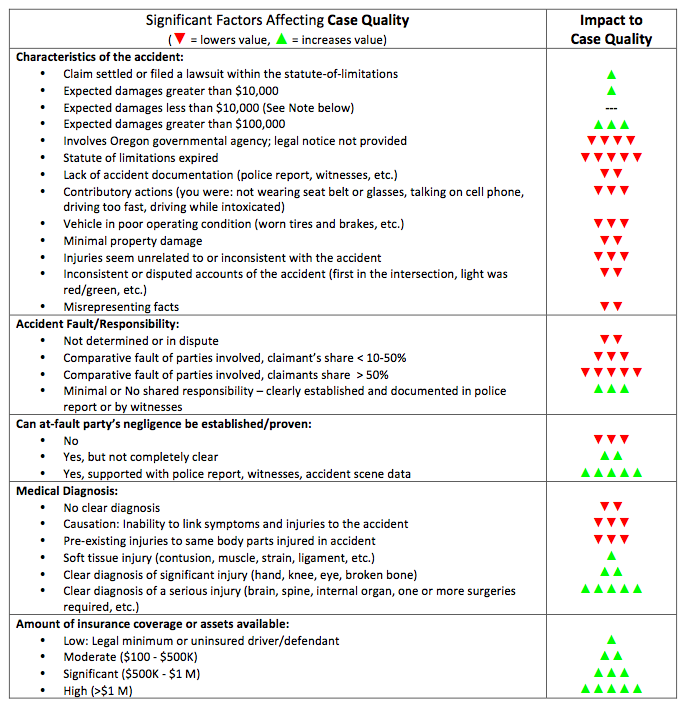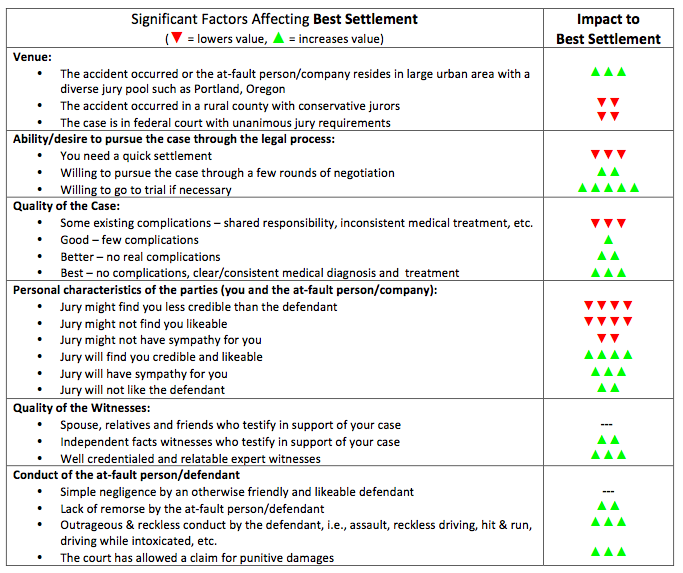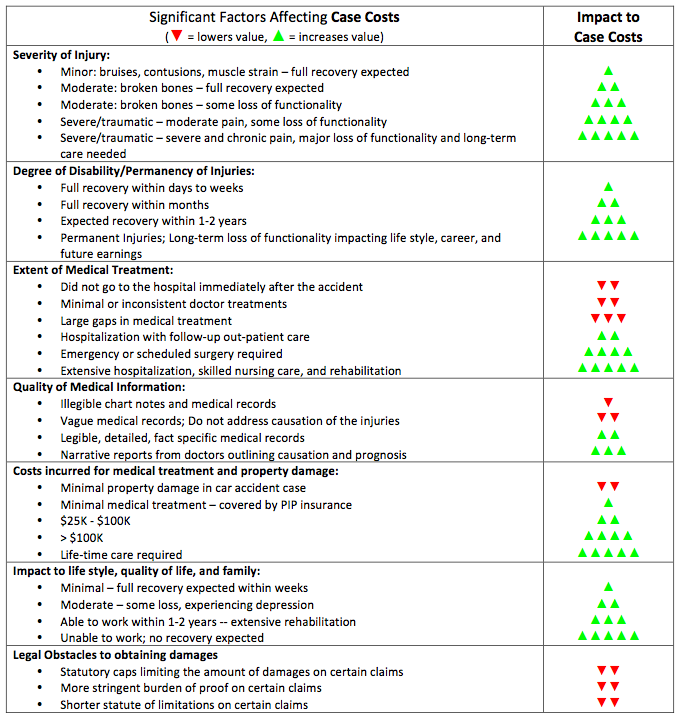What is my personal injury case worth?

This is a complex question that is not easily answered. Determining the potential value of a personal injury case requires thoughtful evaluation and gathering of facts by an experienced personal injury lawyer. Just as the circumstances are different for every case, the potential value of a personal injury case also varies. In fact, valuing personal injury cases is part art and part science.
Ultimately, the value of a personal injury case comes down to “damages” – figuring out what your injuries have cost you monetarily, physically, and mentally (and in some cases, whether the defendant’s conduct should be punished). While the severity of your damages is the driving factor to the value of your Oregon personal injury case, there are many other factors that can increase or reduce the value.
There are no formulas that will determine the value of a personal injury case because every case is different.
Sometimes a client has searched the Internet or read something claiming a “formula” can predict the value of his/her injury claim. For instance, I have heard people claim that case value = (total medical expenses) + (total medical expenses x 3 for pain & suffering). This is an urban myth. There are so many different factors that can influence the value of a case that a formula could never work.
So How Do You Determine Fair and Reasonable Claim Value?
In theory, it is the compensation paid by the at-fault person to the injured victim to restore their physical, emotional and financial injuries to their pre-accident condition – in other words, make the injured person whole again. While this sounds simple, the problem is how can this be done when injuries can be permanent, such as the loss of a limb, or create diminished capacity, such as a brain injury? What if the injured party dies? How can the emotional scars and “pain & suffering” created by an accident be erased? Or how can someone who has been seriously injured deal with the impact on their career, future earnings, and support of their family?
While it may seem reasonable to the injured party that all expenses incurred as a result of the accident be paid, and then more for “pain and suffering,” insurance companies and corporations look at it in a much different way. Their aggressive claims adjusters and legal teams want to reduce the value of your Oregon personal injury claim and avoid paying altogether if they can.
Insurance Company Excuses
Insurance companies may use the following excuses or tactics to reduce the value of a personal injury claim:
- Not compensate medical costs they think are unreasonable or unnecessary.
- Reduce the value of the claim by the percentage that they deem the claimant (injured party) may be responsible or contributed to the cause of the accident. In Oregon, this is known as comparative fault.
- Not compensate future medical costs they think are not needed.
- Not compensate for lost wages or potential earnings they think are unfair, exaggerated, or speculative. This is especially true in cases where the injured victim is self-employed, makes commissions or whose income fluctuates.
- Reduce compensation based on the injured party’s character, likeability, or belief they are exaggerating their injuries, i.e. they do not deserve that level of compensation.
- Lower compensation on the belief that the injured party is unwilling, or unable to sustain a protracted legal battle.
- Reduce compensation because the facts of the case are “blurred”, difficult to prove, or involve complex legal issues that are open to interpretation.
- Reduce compensation because the insurance company’s legal team believes they can successfully exploit weaknesses in the case – misstatements by the injured party, accident responsibility, conflicting accounts of the accident, lack of evidence, etc…
Case Value is Dependent On Many Factors
The value of your personal injury case is dependent on many factors. I analyze a case in three basic categories: quality, case costs, and potential to achieve the maximum value (the best settlement).
1) The Quality relates to the basic facts of the accident.
2) Case Costs relates to the current and future expenses for medical treatment, lost income, and “pain and suffering” to make the injured party “whole.”
3) The potential to achieve the Best Settlement relates to the quality of the case and the client’s ability and motivation to pursue the case through what might be a lengthy legal or negotiation process.
Below are major factors to consider and how they affect the overall personal injury claim value:

An experienced personal injury attorney well versed in Oregon law will always analyze the specific case facts before creating any case value expectations with the client. The case value will increase or decrease depending on the “Quality” of the case, and the factors affecting the “Maximum Potential Value.”
Ultimately, the only people who know the ANSWER to the question: ” how much is your personal injury case worth?” are members of the jury.
Personal Injury Attorney, Travis Mayor

If you or someone you know has been injured as a result of another person’s conduct, and you are looking for a skilled attorney to lead you through the insurance roadblocks, please call today for a free and confidential case evaluation. Local (503) 444-2825 Toll free 1-800-949-1481 or email travis@mayorlaw.com.
For additional information about personal injury cases, insurance, and maximizing your financial recovery, I recommend the following articles on my Blog:
8 Mistakes Insurance Companies Are Hoping You Make!
Oregon Car Accident Guide: Protect Your Rights and Maximize Your Financial Recovery


